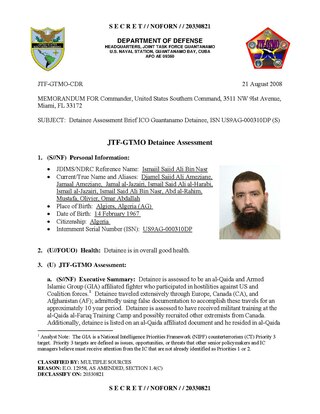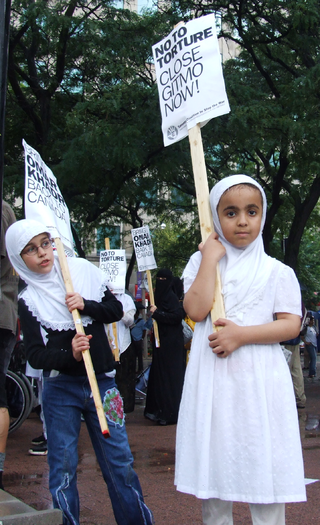Related Research Articles
The Khadr family is an Egyptian-Canadian family noted for their ties to Osama bin Laden and connections to al-Qaeda.

Omar Ahmed Said Khadr is a Canadian who at the age of 15 was detained by the United States at Guantanamo Bay for ten years, during which he pleaded guilty to the murder of U.S. Army Sergeant 1st Class Christopher Speer and other charges. He later appealed his conviction, claiming that he falsely pleaded guilty so that he could return to Canada where he remained in custody for three additional years. Khadr sued the Canadian government for infringing his rights under the Charter of Rights and Freedoms; this lawsuit was settled in 2017 with a CA$10.5 million payment and an apology by the federal government.

Djamel Saiid Ali Ameziane is an Algerian citizen, and former resident of Canada, who was held in extrajudicial detention in the United States Guantanamo Bay detention camps, in Cuba.
The Guantanamo Bay detention camp is a United States military prison within the Guantanamo Bay Naval Base, also referred to as Gitmo, on the coast of Guantánamo Bay in Cuba. As of March 2022, of the 780 people detained there since January 2002 when the military prison first opened after the September 11 attacks, 741 had been transferred elsewhere, 30 remained there, and 9 had died while in custody.

Mohamed Atiq Awayd Al Harbi is a citizen of Saudi Arabia formerly held in extrajudicial detention in the United States's Guantanamo Bay detention camps, in Cuba. His Guantanamo Internee Security Number was 333. The US Department of Defense reports that he was born on July 13, 1973, in Riyadh, Saudi Arabia.

Ghaleb Nassar Al Bihani is a citizen of Yemen formerly held in the United States Guantanamo Bay detainment camps, in Cuba. The Department of Defense estimate that he was born in 1979, in Tabuk, Saudi Arabia.

Daniel Fried is an American diplomat, who served as assistant secretary of state for European and Eurasian affairs from 2005 to 2009 and United States ambassador to Poland from 1997 to 2000. He also served as special envoy for Guantanamo closure and co-ordinator for United States embargoes. Fried retired from the State Department in February 2017 after forty years of service.

Ali Hamza Ahmad Suliman al-Bahlul is a Yemeni citizen who has been held as an enemy combatant since 2002 in the United States Guantanamo Bay detention camp. He boycotted the Guantanamo Military Commissions, arguing that there was no legal basis for the military tribunals to judge him.
Khalid Sulaymanjaydh Al Hubayshi is a citizen of Saudi Arabia who was held in extrajudicial detention in the United States Guantanamo Bay detention camps, in Cuba. Al Hubayshi, who acknowledged some jihadists' activity, spent three years in Guantanamo, a further years in Saudi Arabia's al-Ha'ir Prison, prior to graduating from the Saudi jihadist rehabilitation program. Several western journalists have interviewed him, and accepted that he appears to have successfully reintegrated into the mainstream of Saudi society.

In the years after the September 11, 2001 attack on the World Trade Center in New York City, Yemen became a key site for U.S. intelligence gathering and drone attacks on Al-Qaeda. According to the 2012 U.S. Global Leadership Report, 18% of Yemenis approved of U.S. leadership, with 59% disapproving and 23% uncertain. According to a February 2015 report from the Congressional Research Service, U.S. officials considered Al-Qaeda in the Arab Peninsula the Al-Qaeda affiliate "most likely to attempt transnational attacks against the United States."

Michelle Shephard is an independent investigative reporter, author and filmmaker. She has been awarded the Michener Award for public service journalism and won Canada's top newspaper prize, the National Newspaper Award, three times. In 2011, she was an associate producer on a documentary called Under Fire: Journalists in Combat. She produced the National Film Board documentary, Prisoners of the Absurd, which premiered at Amsterdam's film festival in 2014. Shephard also co-directed a film based on her book about Omar Khadr, Guantanamo's Child, which premiered at the Toronto International Film Festival in September 2015.

A Canadian captured by American forces in Afghanistan at the age of 15, Omar Khadr is currently on interim release from prison in Canada pending an appeal of his war-crimes conviction before a military commission in Guantanamo Bay. Formerly the only Western citizen remaining in Guantanamo, Khadr is unique in that Canada refused to seek extradition or repatriation despite the urgings of Amnesty International, the Canadian Bar Association and other prominent organisations. His lawyer Dennis Edney has summarised the differential response towards Khadr stating that "one of the problems" with defending the youth is that he's a member of the Khadr family rather than "a Smith or an Arar"

Sa'id Ali Jabir Al Khathim Al Shihri (1971–2013) was a Saudi Arabian deputy leader of the terrorist group Al-Qaeda in the Arabian Peninsula (AQAP), and possibly involved in the kidnappings and murders of foreigners in Yemen. Said Ali al-Shihri was captured at the Durand Line, in December 2001, and was one of the first detainees held at the Guantanamo Bay detention camps, in Cuba, arriving on 21 January 2002. He was held in extrajudicial detention in American custody for almost six years. Following his repatriation to Saudi custody he was enrolled in a rehabilitation and reintegration program. Following his release, he traveled to Yemen.
The Care Rehabilitation Center is a facility in Saudi Arabia intended to re-integrate former jihadists into the mainstream of Saudi culture. The center is located in a former resort complex, complete with swimming pools, and other recreational facilities.

Guantanamo's Child is a 2015 Canadian documentary film. Directed by Patrick Reed and Michelle Shephard based on Shephard's 2009 book Guantanamo's Child: The Untold Story of Omar Khadr, the film profiles Omar Khadr, a Canadian citizen whose conviction on disputed war crimes charges and incarceration at the Guantanamo Bay detention camp has been a prominent political issue in Canada.
Nasser al-Bahri, also known by his kunya or nom de guerre as Abu Jandal – "father of death" or "the killer", was a member of al-Qaeda in Afghanistan from 1996 to 2000. According to his memoir, he gave his Bay'ah to Osama bin Laden in 1998. He was in al-Qaeda for six years as one of bin Laden's twelve bodyguards, A citizen of Yemen born in Saudi Arabia, al-Bahri was radicalized in his teens by dissident Saudi Ulemas and participated in clandestine political activities which were funded in part by people trafficking. Determined to become a jihadist, he went first to Bosnia and then, briefly, to Somalia before arriving in Afghanistan in 1996 in the hope of joining al-Qaeda, which he soon did. After four years, al-Bahri became "disillusioned", largely because bin Laden consolidated al-Qaeda's relationship with the Taliban by giving his Bayʿah to its leader, Mullah Omar, but also because he had married and become a father.
In January 2009, the President of Yemen, Ali Abdullah Saleh announced plans to start a new Yemeni jihadist rehabilitation program similar to the Saudi jihadist rehabilitation program. According to Michelle Shephard, reporting for the Toronto Star in September 2009, Yemen had been an innovator in jihadist rehabilitation, with an effort led by the judge Hamoud al-Hitar, called the "Committee for Religious Dialogue". Shephard wrote in September 2009 that she found no sign of the new program during a recent visit.

Andy Worthington is a British historian, investigative journalist, and film director. He has published three books, two on Stonehenge and one on the war on terror, been published in numerous publications and directed documentary films. Articles by Worthington have been published in The New York Times, The Guardian, The Huffington Post, AlterNet, ZNet, the Future of Freedom Foundation and Amnesty International, and Qatar-based Al Jazeera. He has appeared on television with Iran-based Press TV In 2008, he began writing articles for Cageprisoners, and became its Senior Researcher in June 2010.
References
- 1 2 3 4 Kevin Peraino (5 June 2009). "The Reeducation of Abu Jandal: Can jihadists really be reformed? Closing Guantanamo may depend on it". Newsweek. Archived from the original on 2 June 2009. Retrieved 5 June 2009.
- ↑ "الهتار يعد لقانون المساجد وإنشاء مجلس أعلى للأوقاف والإرشاد". yemen-nic.info. Retrieved 15 January 2023.
- 1 2 3 Michelle Shephard (19 September 2009). "Where extremists come to play". Toronto Star. Archived from the original on 23 September 2009.